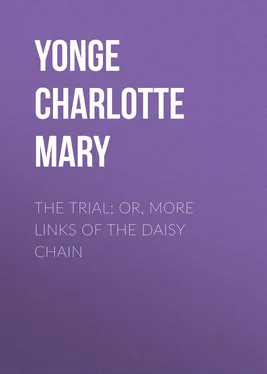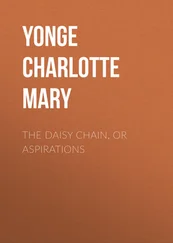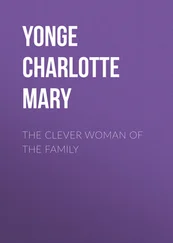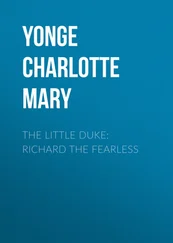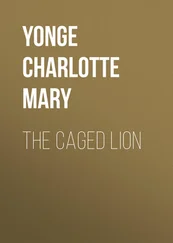Charlotte Yonge - The Trial; Or, More Links of the Daisy Chain
Здесь есть возможность читать онлайн «Charlotte Yonge - The Trial; Or, More Links of the Daisy Chain» — ознакомительный отрывок электронной книги совершенно бесплатно, а после прочтения отрывка купить полную версию. В некоторых случаях можно слушать аудио, скачать через торрент в формате fb2 и присутствует краткое содержание. Жанр: foreign_prose, literature_19, Европейская старинная литература, foreign_antique, на английском языке. Описание произведения, (предисловие) а так же отзывы посетителей доступны на портале библиотеки ЛибКат.
- Название:The Trial; Or, More Links of the Daisy Chain
- Автор:
- Жанр:
- Год:неизвестен
- ISBN:нет данных
- Рейтинг книги:4 / 5. Голосов: 1
-
Избранное:Добавить в избранное
- Отзывы:
-
Ваша оценка:
- 80
- 1
- 2
- 3
- 4
- 5
The Trial; Or, More Links of the Daisy Chain: краткое содержание, описание и аннотация
Предлагаем к чтению аннотацию, описание, краткое содержание или предисловие (зависит от того, что написал сам автор книги «The Trial; Or, More Links of the Daisy Chain»). Если вы не нашли необходимую информацию о книге — напишите в комментариях, мы постараемся отыскать её.
The Trial; Or, More Links of the Daisy Chain — читать онлайн ознакомительный отрывок
Ниже представлен текст книги, разбитый по страницам. Система сохранения места последней прочитанной страницы, позволяет с удобством читать онлайн бесплатно книгу «The Trial; Or, More Links of the Daisy Chain», без необходимости каждый раз заново искать на чём Вы остановились. Поставьте закладку, и сможете в любой момент перейти на страницу, на которой закончили чтение.
Интервал:
Закладка:
More than an hour had passed, and all within the house was as still as ever; and through the window there only came such sounds as seem like audible silence—the twittering of birds, the humming of bees, the calls of boys in distant fields, the far-away sound of waggon-wheels—when there was a slight move, and Mary, in the tension of all her faculties, had well-nigh started, but restrained herself; and as she saw the half-closed fingers stretch, and the head turn, she leant forward, and touched her father's hand.
Dr. May was on his feet even before those brown eyes of Leonard's had had time to unclose; and as Mary was silently moving to the door, he made a sign to her to wait.
She stood behind the curtain. 'You are better for your sleep.'
'Yes, thank you—much better.'
The Doctor signed towards a tray, which stood by a spirit-lamp, on a table in the further corner. Mary silently brought it, and as quietly obeyed the finger that directed her to cordial and spoon—well knowing the need—since that unserviceable right arm always made these operations troublesome to her father.
'Have you been here all night, Dr. May?'
'Yes; and very glad to see you sleeping so well.'
'Thank you.' And there was something that made Mary's eyes dazzle with tears in the tone of that 'Thank you.' The Doctor held out his hand for the spoon she had prepared, and there was another 'Thank you;' then, 'Is Ave there?'
'No, I made her go to bed. She is quite well; but she wanted sleep sorely.'
'Thank you,' again said the boy; then with a moment's pause, 'Dr. May, tell me now.'
Mary would have fled as breaking treacherously in upon such tidings; but a constraining gesture of her father obliged her to remain, and keep the cordial ready for immediate administration.
'My dear, I believe you know,' said Dr. May, bending over him—and Mary well knew what the face must be saying.
'Both?' the faint tones asked.
'Recollect the sorrow that they have been spared,' said Dr. May in his lowest, tenderest tones, putting his hand out behind him, and signing to Mary for the cordial.
'She could not have borne it;' and the feebleness of those words made Mary eager to put the spoon once more into her father's hands.
'That is right, my boy. Think of their being together;' and Mary heard tears in her father's voice.
'Thank you,' again showed that the cordial was swallowed; then a pause, and in a quiet, sad, low tone, 'Poor Ave!'
'Your mending is the best thing for her.'
Then came a long sigh; and then, after a pause, the Doctor knelt down, and said the Lord's Prayer—the orphan's prayer, as so many have felt it in the hour of bereavement.
All was quite still, and both he and Mary knelt on for some short space; then he arose in guarded stillness, hastily wiped away the tears that were streaming over his face, and holding back the curtain, showed Mary the boy, again sunk into that sweet refreshing sleep. 'That is well over,' he said, with a deep sigh of relief, when they had moved to a safe distance. 'Poor fellow! he had better become used to the idea while he is too weak to think.'
'He is better?' asked Mary, repressing her agitation with difficulty.
'I believe the danger is over; and you may tell his sister so when she wakes.'
CHAPTER III
And a heart at leisure from itself
To soothe and sympathize.—Miss Waring
Recovery had fairly set in, and 'better' was the universal bulletin, eating and drinking the prevailing remedy.
Henry Ward had quickly thrown off his illness. The sense that all depended on him, acted as a stimulus to his energies; he was anxious to be up and doing, and in a few days was down-stairs, looking over his father's papers, and making arrangements. He was eager and confident, declaring that his sisters should never want a home while he lived; and, when he first entered his brother's room, his effusion of affection overwhelmed Leonard in his exceeding weakness, and the thought of which during the rest of the day often brought tears to his eyes.
Very grateful to Dr. May, Henry declared himself anxious to abide by his advice; and discussed with him all his plans. There had been no will, but the house and land of course were Henry's. The other property gave about £2000 to each of the family; and Averil had about as much again from the old aunt, from whom she had taken her peculiar name. The home of all should, of course, still be their present one; Averil would teach her sisters, and superintend the house, and Leonard continue at the school, where he had a fair chance of obtaining the Randall scholarship in the course of a year or two. 'And if not,' said Henry, 'he may still not lose his University education. My father was proud of Leonard; and if he would have sent him there, why should not I?'
And when Dr. May thought how his own elder sons had insisted on greater advantages of education for their juniors than they had themselves enjoyed, he felt especially fatherly towards the young surgeon. On only one point was he dissatisfied, and that he could not press. He thought the establishment at Bankside too expensive, and counselled Henry to remove into the town, and let the house; but this was rejected on the argument of the uncertainty of finding a tenant, and the inexpediency of appearing less prosperous; and considering that Mr. and Mrs. Ward had themselves made the place, Dr. May thought his proposal hard-hearted. He went about impressing every one with his confidence in Henry Ward, and fought successfully at the Board of Guardians to have him considered as a continuation of his father, instead of appointing a new union doctor; and he watched with paternal solicitude that the young man's first return to his practice should be neither too soon for his own health or his patients' fears; giving him no exhortation more earnest, nor more thankfully accepted, than that he was to let no scruple prevent his applying to himself in the slightest difficulty; calling him in to pauper patients, and privately consulting in cases which could not be visited gratis. The patronage of Henry Ward was one of the hobbies that Dr. May specially loved, and he cantered off upon it with vehemence such as he had hardly displayed for years.
Aubrey recovered with the tardiness of a weakly constitution, and was long in even arriving at a drive in the brougham; for Dr. May had set up a brougham. As long as Hector Ernescliffe's home was at Stoneborough, driving the Doctor had been his privilege, and the old gig had been held together by diligent repairs; but when Maplewood claimed him, and Adams was laid aside by rheumatism, Flora would no longer be silenced, and preached respectability and necessity. Dr. May did not admit the plea, unless Adams were to sit inside and drive out of window; but then he was told of the impropriety of his daughters going out to dinner in gigs, and the expense of flies. When Flora talked of propriety in that voice, the family might protest and grumble, but were always reduced to obedience; and thus Blanche's wedding had been the occasion of Ethel being put into a hoop, and the Doctor into a brougham. He was better off under the tyranny than she was, in spite of the solitude he had bewailed. Young Adams was not the companion his father had been, and was no loss; and he owned that he now got through a great deal of reading, and at times a great deal of sleep; and mourned for nothing but his moon and stars—so romantic a regret, that Dr. Spencer advised him not to mention it.
After Aubrey's first drives, Dr. Spencer declared that the best way of invigorating him would be to send him for a month to the sea-side, while the house could be thoroughly purified before Gertrude's return. Dr. Spencer and Mary would take care of Dr. May; and Ethel had begun to look forward to a tete-a-tete with Aubrey by the sea, which they had neither of them ever seen, when her anticipations were somewhat dashed by her father's exclaiming, that it would be the best thing for Leonard Ward to go with them. She said something about his not being well enough to travel so soon.
Читать дальшеИнтервал:
Закладка:
Похожие книги на «The Trial; Or, More Links of the Daisy Chain»
Представляем Вашему вниманию похожие книги на «The Trial; Or, More Links of the Daisy Chain» списком для выбора. Мы отобрали схожую по названию и смыслу литературу в надежде предоставить читателям больше вариантов отыскать новые, интересные, ещё непрочитанные произведения.
Обсуждение, отзывы о книге «The Trial; Or, More Links of the Daisy Chain» и просто собственные мнения читателей. Оставьте ваши комментарии, напишите, что Вы думаете о произведении, его смысле или главных героях. Укажите что конкретно понравилось, а что нет, и почему Вы так считаете.
